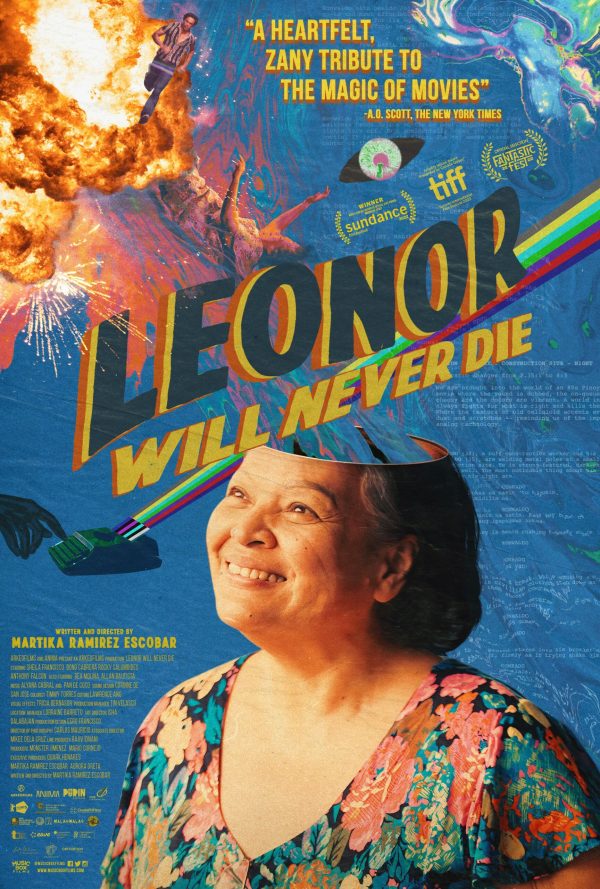
“Leonor Will Never Die” (2022). Cast: Sheila Francisco, Bong Cabrera, Anthony Falcon, Rocky Salumbides, Rea Molina, Alan Bautista, Ryan Eigenmann, Dido de la Paz, Raion Sandoval, Tami Monsod, DMS Boongaling. Director: Martika Ramirez Escobar. Screenplay: Martika Ramirez Escobar. Web site. Trailer.
When we feel like we’ve lost something, we often wonder if we’ll ever get it back. Those who innately see the glass as half full generally have the requisite optimism needed to reclaim it. But those whose worldview is less enthusiastic frequently treat their loss as permanent and irretrievable. But need things be that way? Are such black and white outlooks fixed and unalterable? When we consider that those attitudes are rooted in our beliefs – perspectives that are eminently changeable – it quickly becomes apparent that we’re not hopelessly reconciled to an irreversible fate, a scenario that an aging creative discovers for herself in the quirky but insightful new Filipino comedy, “Leonor Will Never Die.”
Leonor Reyes (Sheila Francisco) has fallen on hard times. As a onetime-groundbreaking figure in the Filipino movie industry, Leonor made quite a name for herself as the creator of cheesy but immensely popular action adventure films in the 1970s and ʼ80s. However, in the ensuing years, she’s had her share of issues, including encroaching old age, worsening memory loss, mounting unpaid bills and the pain associated with the untimely death of her son, Ronwaldo (Anthony Falcon), a tragedy from which she’s never fully recovered. Ronwaldo’s passing was especially difficult for her, given that he was her favorite, a preference that often hurt the feelings of her other son, Rudi (Bong Cabrera), a somewhat inept, directionless but kindly middle-aged soul. Rudi’s quiet despair over this is often exacerbated by Leonor’s lack of appreciation for his concern for her well-being, an attitude that she sees as needlessly clingy and overprotective, leaving her somewhat concerned and frequently annoyed. And all of this is made worse when Ronwaldo’s ghost periodically shows up for unexpected visits, reminding Leonor of his absence and Rudi of his mother’s favoritism.
Leonor needs a spark to get her out of her rut, and that opportunity comes while perusing the newspaper one day. She spots an ad putting out a call for movie scripts, and it gives her an idea. She remembers an unfinished screenplay that she had begun working on years ago, a project that she believes might have production potential if she were to complete it. So she hauls it out of mothballs and sets back to work on it in earnest. She’s so eager, in fact, that it’s the first undertaking that’s given her any joy in ages.
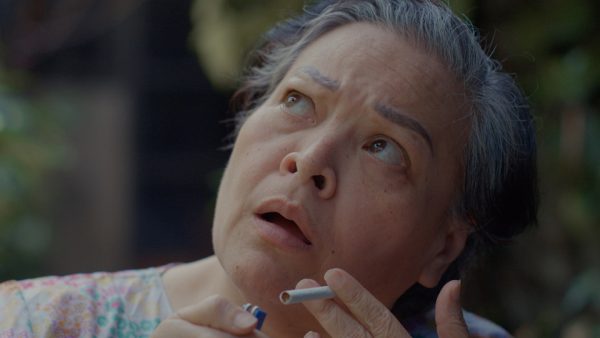
Leonor’s script for “The Return of the Kwago” tells the story of a working class action hero named Ronwaldo (sound familiar?) (Rocky Salumbides) seeking to avenge the death of his brother at the hands of local thugs. He also seeks to rescue a damsel in distress, Isabella (Rea Molina), the reluctant girlfriend of a mob boss who has her squarely under his thumb. For the benefit of viewers, images from this work in progress come to life in the film, essentially creating a movie within a movie, one distinguished from the main narrative by cinematography and other production elements typical of pictures in this genre. While the trite plot of “Kwago” exudes all of the clichés typically found in campy romps like this, working on the project nevertheless fills Leonor with an unbridled sense of enthusiasm, as evidenced by the fervor she exhibits while banging away on the keys of her typewriter. But, despite everything going along so well, events suddenly take an unexpected turn.
While taking a break from her work, as Leonor strolls outside her apartment building, a television set falls from an upstairs open window and hits her on the head, putting her in a coma. Rudi and Leonor’s ex-husband, Valentin (Alan Bautista), diligently attend to her hospital care, aided by an enigmatic physician (Tami Monsod) who clearly has eyes for Rudi. Ronwaldo’s ghost pays periodic visits as well, offering insights and suggestions. But Leonor’s condition remains unchanged – at least to those looking after her. In her own world, however, Leonor has begun leading a full and active life – as a character in the thick of her own unfolding screenplay.
Leonor’s participation in this inner world scenario fulfills several functions. For starters, it helps her work out the plot of the remaining portion of the story. But there’s more to it than that. It also provides her with an opportunity to address the unresolved issues of her life, such as her relationship with Rudi, her lingering grief for Ronwaldo and learning how to take back her sense of personal power. It becomes an experience where she gets a chance to rewrite the script of her life – and to have things turn out the way she wants them to for once. And, when the “Kwago” experience becomes intertwined with the everyday life she had come to know so well, things become especially interesting. Leonor’s experience thus sets an example for the rest of us, one in which we have an opportunity to write the scripts of our own lives.
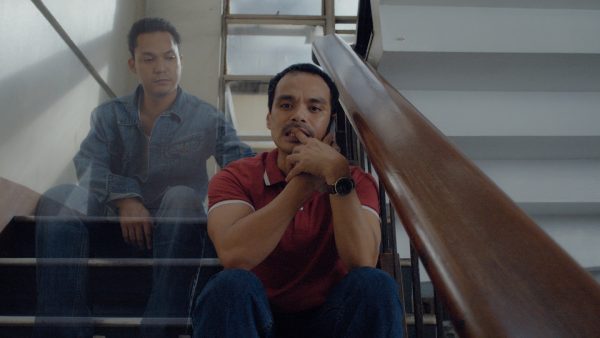
The key to writing (or rewriting) the scripts of our lives rests with the beliefs that provide the foundation for them. In a sense, think of this as being akin to the story or the narrative that underlies a screenplay. Without this, there would be no script to work with. And this all unfolds thanks to the conscious creation process, the philosophy that maintains we draw upon these intangible resources for manifesting the reality we experience. Whether or not Leonor has ever heard of this concept is up for debate, but, given the experience she’s now undergoing in her consciousness, she has a chance to put its principles into practice and to witness what they can yield.
Leonor’s coma experience is valuable in a highly significant way: Because she’s actively setting the direction of the manner in which events arise and play out, and because she’s now definitively aware that this is happening, she’s able to see how we’re the authors of our own stories and what makes them up. And the effect of this is quite empowering. In fact, in Leonor’s case, it’s enabled her to take back the power she once wielded but has been without in recent years. It also allows her to mend fences that have fallen into disrepair over time. That can be truly revitalizing for someone who’s been feeling otherwise for a long time.
The lucidity that comes with the territory here also enables Leonor to steer the course of her story in the direction in which she wants it to go. This, too, likely proves rejuvenating, especially after years to the contrary. Instead of feeling like the victim of random, capricious chance, Leonor feels like she has become the master of her destiny, able to cause things to turn out the way she would like to see them unfold. That’s quite a fulfilling feeling, one that most of us would probably like to experience.
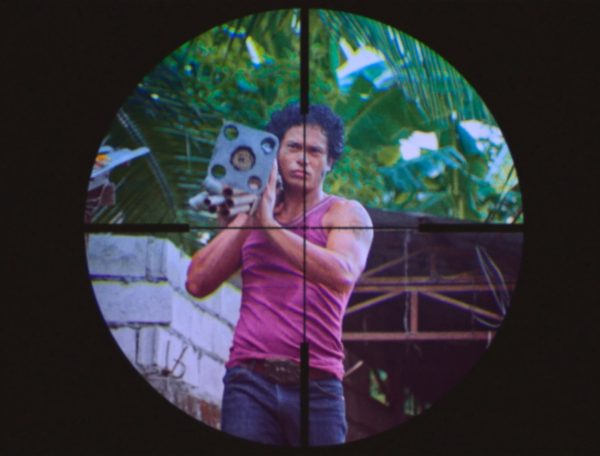
But the beauty of that is that we can experience it for ourselves. Once we’re aware that we’re the captains of our own ships, we can steer them in whatever direction we’d like. That can be quite satisfying, particularly among those of us who feel we have lost our power and witnessed our lives deteriorate in ways that leave us feeling out of sorts, out of luck and without hope for a better future.
In Leonor’s case, this can help to renew her outlook going forward. Whether that feeling is expressed through waking consciousness or entirely in the recesses of her mind, it doesn’t really matter. It’s an opportunity for the essence of her being to feel satisfied, fulfilled and empowered. And, in the end, isn’t that what really matters most? We should all be so fortunate to have the wherewithal to recognize and live out such a state of mind, and Leonor sets an inspiring example for us to follow.
Of course, in circumstances like these, some might be concerned that the lines between reality and fantasy can become all too easily blurred, making it difficult to distinguish where one leaves off and the other begins. This can be especially true for creative types (particularly writers). Concerns about ambiguity and distinction can easily arise. Indeed, can someone become so absorbed in the manifestation of a creative undertaking that perspective becomes lost? And what does this mean for those who care (and worry) about the artist?
Ultimately, however, one could argue, do such distinctions really matter? Isn’t one’s sense of happiness and fulfillment really what’s most in the long run? And does it truly matter where such outcomes materialize? Is the realm of our consciousness any less valid than the paradigm of physical existence? This is a point that often rattles my cage when characters in sci-fi and similar stories prattle on and on about what’s “real” and what’s not. Isn’t reality a relative matter, one in which beliefs and consciousness determine what arises and wherein venue considerations are secondary, if even relevant at all?
Some might find such a notion troubling, as it potentially undermines one’s sense of certainty when it comes to the nature of existence – that it must innately possess certain qualities (such as physicality) when it comes to its intrinsic nature. At the same time, though, embracing the idea that personal satisfaction is what each of us makes of it, regardless of comparatively mundane considerations like locale, can be quite liberating, opening up an array of vistas for conscious exploration and creation where the only limiting factor is our own beliefs – and where we can manifest for ourselves whatever we will in the pursuit of our own contentment. Talk about empowerment!
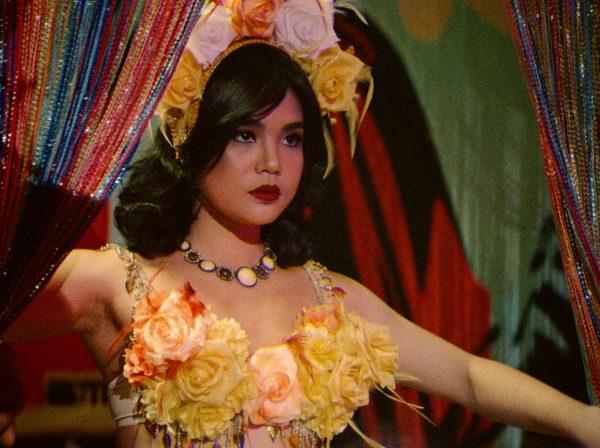
Leonor’s choices (and the beliefs she embraces in their fulfillment) may not be the same ones many of us would make. Being at the helm of a tacky shoot-em-up may not be our idea of what gives us satisfaction. However, if it makes her feel contented and accomplished – and if doing so helps her resolve issues that she’s been unable to reconcile otherwise – who are we to argue or judge? More power to her in her endeavor. May we all be so inclined. And may Leonor never die.
Writer-director Martika Ramirez Escobar’s multiple-layered debut feature is an absolute delight, one that tells a hilarious yet perceptive tale, a challenging narrative combination to pull off as successfully as it is here. It’s an accomplishment comparable to what was achieved in such other 2022 releases as “Everything Everywhere All at Once” and “Strawberry Mansion,” taking heady topics and making them entertaining. The story-within-a-story is deftly handled, with its respective parallel tracks skillfully woven and serving as great mirrors of one another. And, as these two parallel yet intertwined stories play out, a curious mix of synchronicities, kooky laugh-out-loud moments and metaphysical insights into the nature of existence all begin to emerge (sometimes simultaneously), providing viewers with much to both ponder and chuckle over. The “Kwago” sequences are especially noteworthy. Leonor’s emerging action adventure project is reminiscent of films frequently made in the Philippines in the 1970s, with elements similar to those also found in classic martial arts and Blaxploitation pictures of the era. These segments present a campy yet lovingly reverential homage to those films, capably and intentionally mimicking them in terms of their clichéd camera work, trite dialogue and sloppy technical elements (like out-of-sync vocal dubbing). Admittedly, the film begins to drag a little in the home stretch, but, as a very deserving Independent Spirit Award nominee for best international film, this is must-see viewing for those who appreciate unexpectedly profound subject matter served up with a healthy slathering of unrepentant kitsch.
Many of us dislike change. But, as daunting as that prospect can be, it pales in comparison to other even less palatable circumstances, like despair, hopelessness and depression. Yet it’s mind boggling how many of us will readily saddle ourselves with such conditions, believing them to be inherently permanent. Indeed, it’s astounding how anyone could simply roll over and accept what’s seemingly handed to us without question. But, as Leonor’s remarkable odyssey illustrates, that’s far from the truth, as long as we’re willing to make the effort to invoke change for ourselves, starting with the beliefs that bring our existence into being. With that knowledge in hand, we can follow Leonor’s lead, reclaim our personal power and rewrite the script of our life. And what a story that would make!
Copyright © 2022, by Brent Marchant. All rights reserved.

No comments:
Post a Comment